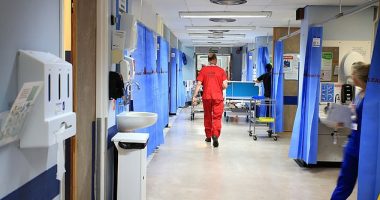For some, it’s a vital pick-me-up and no day can start without it. Others believe there are myriad health benefits to drinking it, citing studies that suggest regular consumption might fight everything from heart disease to dementia. But coffee – which last year overtook tea as Britain’s favourite hot drink – doesn’t agree with everyone. Reports suggest even modest amounts can trigger anxiety, heart palpitations and sleepless nights.
The cause, of course, is caffeine – the stimulant that’s one of the main components of coffee.
But why do people react badly? We spoke to coffee experts to find out – and they revealed the surprising ways you can maximise the benefits and enjoy the buzz while avoiding the downsides.


Coffee – which last year overtook tea as Britain’s favourite hot drink – doesn’t agree with everyone


In 2019, pop megastar Taylor Swift said L-theanine was her favourite supplement because it helps with her ‘stress and anxiety’
SENSITIVITY TO COFFEE IS IN OUR GENES
Experts say differing reactions to coffee lies in our DNA. Caffeine can linger in the body for anything from 90 minutes to nine hours depending on how quickly the liver – the organ which filters toxins from the blood – breaks it down.
Scientists have discovered that a specific gene, CYP1A2, controls how quickly the liver processes caffeine. Around half the population have two copies of the CYP1A2 gene, which means they burn through caffeine quickly. Roughly four in ten only have one copy of the gene, so coffee stays in their system longer. And about one in ten have no CYP1A2 gene. Their bodies can still break down caffeine, but it is significantly more difficult for them, meaning the stimulant stays in the blood for much longer – raising the risk of sleep loss.
Some research suggests that people without the CYP1A2 gene can even develop high blood pressure as a result of drinking coffee. ‘Many people can break down coffee really fast, meaning they get that instant energy boost,’ says Flick Lucas, a sports nutrition expert at Oxford Brookes, who is researching the effect of giving caffeine to athletes before competitions.
‘But some don’t get that advantage and the caffeine can stay in the body for up to nine hours, triggering unwelcome symptoms. It’s only really in the past few years that we’ve begun to understand just how big a role genetics plays in this effect.’
WHY TOO MUCH MAKES YOU FEEL DREADFUL
Coffee – or rather caffeine – works by altering the flow of certain compounds and chemicals to the brain.
In order to sleep, the body produces a chemical called adenosine. When absorbed into the brain, it causes people to feel tired and slows the heart rate. Throughout the day, the amount of adenosine in the body builds up, which is why it is normal to begin to feel sleepy in the afternoon.
But caffeine blocks the receptors in the brain through which adenosine is processed. ‘This leaves you feeling more alert and awake,’ says Dr Duane Mellor, a dietitian at Aston University. There are, of course, downsides to this. ‘You don’t want to be alert all the time with a thumping heart beat,’ adds Dr Mellor.
‘Adenosine also has a calming effect on the body, so if you take that away for long periods people can begin to feel anxious.’ Experts say people who drink coffee regularly are less sensitive to its effects as their adenosine receptors build up caffeine resistance.
Research also suggests that people who smoke are less impacted by coffee because their adenosine receptors are already blunted by the effect of tobacco. However, studies suggest that genes are the main factor in how coffee affects the body.
JITTERY? BLAME THAT CHEAP INSTANT
Experts say the type of bean used to make the coffee impacts the amount of caffeine it contains. There are two coffee beans used by the vast majority of producers – arabica and robusta.
Arabica, which is the more expensive and popular bean, grows higher up in mountains.
It tends to have a sweeter flavour. But robusta has 40 per cent more caffeine. Most coffee shops will use only arabica beans. The same is true for more expensive instant coffee such as Nescafe Gold Blend. However, cheaper types of instant, such as Nescafe Original, contain a blend of arabica and robusta, meaning these can have a higher caffeine content. Even more crucial is how the coffee is prepared, according to experts.
At its most basic level, coffee is a combination of water and ground coffee beans, but the preparation can make a huge difference to the caffeine content. ‘The more contact time there is between the coffee and the water, the more caffeinated the drink is going to be,’ says Kurt Stewart, founder of Volcano Coffee Works in South London. ‘So American-style filter coffee [where hot water is passed through the ground beans and a paper filter] is never going to be very caffeinated, which is why you can drink it all day.
‘The most caffeine-heavy coffee is cold brew, where the ground beans are soaked in cool water for up to 24 hours. If you’re sensitive to caffeine I would avoid cold brew. The espresso machine stuff you would normally get in a coffee shop is somewhere in the middle on the caffeine scale.
‘It’s fine to drink in small amounts, but you wouldn’t want to have more than a few in a short space of time.’
ESPRESSO OVERDOSE? HERE’S WHAT TO DO
Scientists say there are steps people can take to counteract the undesirable effects of caffeine.
Studies show that drinking plenty of water – roughly one large glass for every coffee – can reduce the risk of the jitters. This is because coffee is a diuretic, which means it dehydrates the body. Experts say this can make the side effects of coffee worse, which is why they recommend drinking lots of water if you feel over-caffeinated.
Research also suggests that brisk exercise – for example running or cycling for 20 minutes – can reduce coffee anxiety after it has begun, as well as alleviate the risk of sleepless nights.
Experts argue this is likely due to the fact that exercise speeds up the metabolism of caffeine, breaking it down more quickly.
In recent years, there has been a growing popularity for a supplement called L-theanine, which some social media influencers claim can eliminate jitters if taken before drinking coffee.
L-theanine is an amino acid found in black and green tea. In supplement form, it typically comes as a flavourless soluble powder (this can be mixed into a protein shake and some people also mix it directly into coffee). There have been a number of studies which suggest it has an anti-anxiety effect.
In 2019, pop megastar Taylor Swift said L-theanine was her favourite supplement because it helps with her ‘stress and anxiety’. Experts say there are suggestions that people may benefit from L-theanine. ‘Many people claim that drinking tea, which often contains as much caffeine as coffee, doesn’t make them feel anxious,’ says Dr Mellor.
‘It’s possible that this could be because it contains L-theanine. The studies which claim it works as an anti-anxiety supplement have been too small to draw any firm conclusions, but the science does make sense.’
DECAFF COULD HELP MORE THAN YOU THINK
One reason that researchers believe coffee may have health benefits is that it contains polyphenols, a group of compounds found in plants that are believed to have anti-inflammatory properties. Recent research also suggests that it contains a surprising amount of fibre – a crucial nutrient mainly found in fruit, vegetables and grains.
Professor Tim Spector, a British epidemiologist and creator of the Zoe nutrition app, claims that people who drink three to four cups of coffee a day get ‘considerable amounts of fibre’.
Research suggests that coffee contains around 1.5 grams of fibre – roughly the same as a glass of orange juice. The NHS recommends that people consume around 30 grams of fibre a day, however studies suggest that less than a tenth of Britons get enough fibre.
Decaffeinated coffee is usually created by soaking fresh coffee beans in hot water. Since caffeine is water-soluble, this process removes about 97 per cent of the stimulant, but the rest of the ingredients remain.
‘Decaffeinated coffee still contains the beneficial ingredients,’ says Dr Mellor.
‘And it’s possible it could still give you an energy boost too. For many people, having a coffee is more about the habit than the caffeine, it’s a taste they link with starting the day. And you still get that bitter taste with decaff.’
Experts say that the demand for decaffeinated coffee is rising.
‘We’ve seen a definite uptick in the number of customers requesting it,’ says Kurt Stewart.
‘Many people feel that they still get the coffee buzz from it without the jitters – it’s a sort of placebo effect.’
And for those sceptical of this theory there is good news.
‘Earlier this year, we tested out a half-and-half coffee, a combination of caffeinated and decaffeinated,’ adds Mr Stewart.
‘It was hugely popular, particularly with those who are more sensitive to caffeine and those who want to drink it later in the day.
‘We’re going to be selling more of it and I reckon others might begin to do the same too.’
…but be careful – too much caffeine really can be deadly
It’s not just an urban myth: you really can overdose on coffee, according to studies.
In 2022, a 29-year-old British man died from cardiac arrest after accidentally consuming ‘up to 5g’ of powdered caffeine (not coffee).
Thomas Mansfield, a personal trainer who used caffeine to improve his energy levels while working out in the gym, drank seven times the recommended dose, an inquest heard.
An Italian study, published in 2018, found 92 similar cases of caffeine overdose deaths in medical literature. These deaths also involved consuming more than 5g of caffeine. A standard cup of coffee usually contains between 80 and 100mg of caffeine – meaning you’d need to drink 50 cups to overdose. But drinking more than 500mg has been linked with uncomfortable side effects including heart palpitations and increased blood pressure.
Studies suggest that, for people who are not exercising, around 250mg – roughly two-and-a-half coffees – is an optimum amount of caffeine, and is linked with desirable symptoms such as better concentration and even arousal.
However, experts say that, for athletes, even a small coffee is enough to give them the edge.
‘We’ve found that a single shot of espresso can give athletes the boost they need,’ says researcher Flick Lucas. ‘However, that’s only if you are a fast metaboliser of caffeine.’
Source: Mail Online









